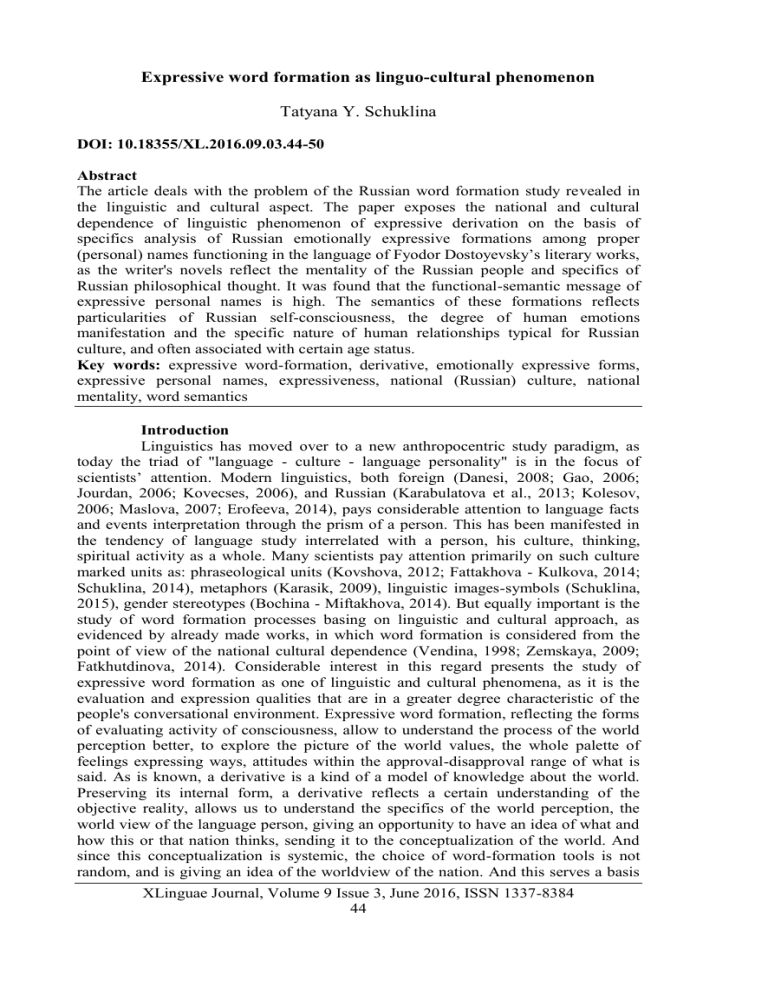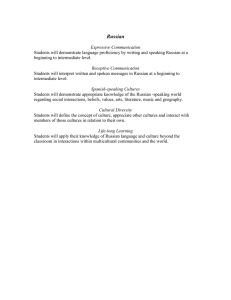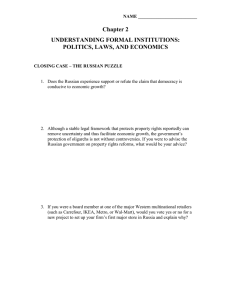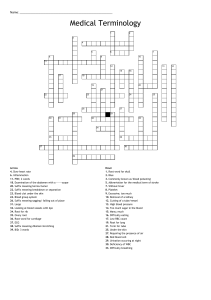Expressive Word Formation in Russian: Dostoevsky's Language
advertisement

Expressive word formation as linguo-cultural phenomenon Tatyana Y. Schuklina DOI: 10.18355/XL.2016.09.03.44-50 Abstract The article deals with the problem of the Russian word formation study revealed in the linguistic and cultural aspect. The paper exposes the national and cultural dependence of linguistic phenomenon of expressive derivation on the basis of specifics analysis of Russian emotionally expressive formations among proper (personal) names functioning in the language of Fyodor Dostoyevsky’s literary works, as the writer's novels reflect the mentality of the Russian people and specifics of Russian philosophical thought. It was found that the functional-semantic message of expressive personal names is high. The semantics of these formations reflects particularities of Russian self-consciousness, the degree of human emotions manifestation and the specific nature of human relationships typical for Russian culture, and often associated with certain age status. Key words: expressive word-formation, derivative, emotionally expressive forms, expressive personal names, expressiveness, national (Russian) culture, national mentality, word semantics Introduction Linguistics has moved over to a new anthropocentric study paradigm, as today the triad of "language - culture - language personality" is in the focus of scientists’ attention. Modern linguistics, both foreign (Danesi, 2008; Gao, 2006; Jourdan, 2006; Kovecses, 2006), and Russian (Karabulatova et al., 2013; Kolesov, 2006; Maslova, 2007; Erofeeva, 2014), pays considerable attention to language facts and events interpretation through the prism of a person. This has been manifested in the tendency of language study interrelated with a person, his culture, thinking, spiritual activity as a whole. Many scientists pay attention primarily on such culture marked units as: phraseological units (Kovshova, 2012; Fattakhova - Kulkova, 2014; Schuklina, 2014), metaphors (Karasik, 2009), linguistic images-symbols (Schuklina, 2015), gender stereotypes (Bochina - Miftakhova, 2014). But equally important is the study of word formation processes basing on linguistic and cultural approach, as evidenced by already made works, in which word formation is considered from the point of view of the national cultural dependence (Vendina, 1998; Zemskaya, 2009; Fatkhutdinova, 2014). Considerable interest in this regard presents the study of expressive word formation as one of linguistic and cultural phenomena, as it is the evaluation and expression qualities that are in a greater degree characteristic of the people's conversational environment. Expressive word formation, reflecting the forms of evaluating activity of consciousness, allow to understand the process of the world perception better, to explore the picture of the world values, the whole palette of feelings expressing ways, attitudes within the approval-disapproval range of what is said. As is known, a derivative is a kind of a model of knowledge about the world. Preserving its internal form, a derivative reflects a certain understanding of the objective reality, allows us to understand the specifics of the world perception, the world view of the language person, giving an opportunity to have an idea of what and how this or that nation thinks, sending it to the conceptualization of the world. And since this conceptualization is systemic, the choice of word-formation tools is not random, and is giving an idea of the worldview of the nation. And this serves a basis XLinguae Journal, Volume 9 Issue 3, June 2016, ISSN 1337-8384 44 for the world picture commonality of the whole nation and the possibility of mutual understanding (Vendina, 1990: 27). Russian word formation is notable by its extensive system of expressive means of word formation. The reason for this lies in the peculiarities of the Russian national character, which, as is noted by cultural studies, is characterized by expressive emotionality, general exuberance, lightness and the need to express their feelings, impulsiveness, good heartedness, kind warmth, sincerity, affection, love of morality, the dependence on the established social attachments, etc. The degree of personal relationships intimacy plays an important role in the Russian cultural tradition; Russians consider it extremely important to convey all the nuances of feelings emerging between people, all the changes and fluctuations in the relationships between them. A strong national-based semantic potential existing behind the external sound envelope of a word is enclosed in the words of subjective evaluation and reflects the attitude towards the word. The researchers note that "...a tangle of human experience is "untwisted" in the process of expressive vocabulary creating, as the meanings of this type formation is preceded by national cultural stereotyping ..." (Telia, 1986: 105). Expressive word formation in the Russian language plays a role, which is hard to be overestimated. In particular, high is the functional connotation of the socalled diminutive suffixes. Expressive word formation in the works of Fyodor Dostoyevsky Peculiarity of expressive word formation as a reflection of the world picture is best manifested in the artistic works of national writers. Artistic image is the most important aesthetic category, which is the result of a particular way of reality perception, its specific vision, and can be considered as an element of a definite culture. Creating an artistic image, the author relies on public and personal experience, as well as on expressive and emphatic powers of linguistic resources, and above all on the national capacity of the word. Of particular importance in the study of the Russian expressive word formation in linguistic and cultural aspect are the works of Fyodor Dostoyevsky - the great Russian writer, who became a mouthpiece of the Russian people’s spirit and practical reason. He created artistic images, which are filled with life and conceptual content; they are used daily as social concepts. His works reflect the mentality of the Russian people, and peculiarities of Russian philosophical thought. Fyodor Dostoyevsky’s worldview determines the choice of language and particularly word-formative means, which the writer uses in his works. The proper (personal) names and common nouns with the so-called subjective evaluation meaning expressed by suffixes -enk-/-onk-, -echk-/-ochk-, ushk-/-yushk-, -chik-, -k- and others are the most illustrative and causing interest in the language and cultural aspect among Russian expressive formations. This work is deals with the study of proper (personal) names derivatives in the novels of Fyodor Dostoevsky "The Brothers Karamazov" and "The Idiot". The labels "diminutive", "caressing", "magnifying", which are traditionally attached to the units of subjective evaluation, indicate only the certain areas of meanings. Characteristics of similar words in literary texts of Fyodor Dostoyevsky functioning manifest a wide range of different meanings that each of them hides. The semantics of such formations is capacious and varied; it allows you to further explore the picture of the world values, to clarify the ways of evaluation expression, to identify a palette of human relations in the range of approval-disapproval of what they say, to get an idea of the worldview and self-consciousness of the Russian people. 45 Expressive formations - proper (personal) names with the suffix -enk-/onkThe most frequent in the works of Fyodor Dostoyevsky are the derivatives of the proper (personal) names with the suffix -enk-/-onk- (Mitenka, Katenka et al.). They usually indicate the warmth, intimacy, good attitude to a person. In the context they exhibit the following meanings: "I have some good feelings for you, talking to you"; "I feel affection and tenderness for you, feeling of sympathy that is experienced in relation to children." For Example: -For I know as a fact, that Mityenka only last week, drunk in a tavern, cried out aloud that he was unworthy of his betrothed, Katyenka... (Dostoevsky, 2008). Although the semantics of these words expresses gentle, tender feelings, which we use to have for children, Fyodor Dostoyevsky calls adults, but not children, these names. In this way, the characters with suffixes -enk-/-onk- attached to their names are likened to children. They are noted for their innocence, childish naivety. Suffix -enk- is, so to say, more "caressing" and more "intimate" than all the others. At the same time -enk- involves personal reaction to communication with the other person. Expressive formations - proper (personal) names with the suffix -ochk-/echkNames with the suffix -ochk-/-echk- indicate special expressiveness that arises in the use of these names, regardless of whether they are used in a conversation with children or with the adults. In many cases, it plays the same structural and functional role, which the suffix -enk- plays for the other names: … I see you are still angry with me, Ganiechka! Why, surely you never really wished to take ME into your family? (Dostoyevsky, 2006) …And he has proscribed to bath Ninochka in some solution… and every day, in the morning and in the evening …(Dostoyevsky, 2008). Interpretation can be formulated as follows: "I feel towards you some good feelings like those, which are experienced, speaking with little children". Short forms of personal names with the suffix -ush- - can attach both suffixes, but only in case the formations with the suffix -enk- are more commonly used and less marked than the names with -echk(а). Thus, in the works of F.M. Dostoyevsky the suffix -echk- in personal names can be found only a few times. For example: (Ivan Karamazov)…- God be with them. Ilyushechka did not allow… God will pay me later. (Dostoevsky, 2008). In this case, the form Ilyushechka presents a delicate and emotionally rich example of how the suffix -ush- is used in personal names. Suffix -echk- gives the name something childish and expresses mild tenderness. But the combination of echk- with -ush- - brings in a great emotional content. Suffix -ush- shows intimacy, which in a natural for him and has nothing to do with children. Suffix --echk- renders tenderness, which is exactly associated with little children. As a result, the name Ilyushechka expresses both intimacy and tenderness, it sounds gently and respectfully, and ideally suits this charming character. Expressive formations - proper (personal) names with the suffix -ushkAnother suffix, which represents a special type of expressivity - is a suffix ushk-. Derivatives with this suffix have the semantics of kindness, tenderness, XLinguae Journal, Volume 9 Issue 3, June 2016, ISSN 1337-8384 46 proximity to a person. But a typical feature of the derivatives with the suffix -ushkcan be considered not so much their "caressing" character as a feeling of pity, compassion for people. In the novel "The Brothers Karamazov" one peasant woman constantly uses a form Nikitushka talking about her unfortunate husband, whom she loved, but above all was sorry for him: …I am tormented for my sonny, father, yes I am. The last sonny was left by us, we had four of them with Nikitushka, but our sons would not stay with us… (Dostoevsky, 2008). Expressiveness of the suffix -ushk- is not related to the child's speech or communication with children. It reflects the philosophy of Russian culture, according to which the humble man deserves pity; he must be treated with empathy, kindness and compassion. The semantics of names with the suffix -ushk- can be formulated as follows: "I feel some kind of good feeling towards you, like the one people experience in relation to, when they think about bad things that can possibly happen to them"; "I want to talk to you (about you) as people talk to the others (of the people), who are very close to them". Expressive formations - proper (personal) names with the suffix -kAmong the Russian expressive suffixes -k- is the most versatile and elusive. One reason, why personal names with this suffix have ambivalent properties, and are difficult to describe, is that the suffix -к- is syncretic. Calling the interlocutor the name with -k(а), the person conveys: " I do not want to be ceremonious with you". This message can transmit disrespect, but it is also compatible with expression of friendly simplicity: (Rogozhin) ... But at that time, upon my mother’s blessing, I procured twenty rubles from Seryozhka, and made my way to Pskov by machine … (Dostoevsky, 2006); or: (Rogozhin) ... Nothing to say about my mom, she is an old woman, reading Menaion, sitting with old wives, but whatever Senka – the brother decides, then so be it… (Dostoevsky, 2006). In the last example, along with a friendly simplicity suffix -к- implies an attitude that can be interpreted as insufficiently respectful. The following example is also interesting: (Rogozhin’s conversation with the Prince) …She has given such one of my shawls to my house maid Katka, which she may have never seen in her life, though she has used to live in luxury … (Dostoevsky, 2006). The name Katka sounds disrespectful, because on the one hand, it does not keep distance, and on the other - does not show tenderness or warmth, although the social situation itself does not involve any manifestation of such feelings. Apart from these, the names with the -k(а) may express some expressive meaning not specified exactly, that can be formulated as follows: "I have some feelings towards you". For example: …I could send Alyoshka, but what is Alyoshka in such affairs? (Dostoevsky, 2008). Sometimes derivatives with the suffix -k- can express a clear contempt for a man, mixed with irony: - Hallo, Ganka, scoundrel! Haven’t expected Parfyon Rogozhin?- repeated Rogozhin reaching the sitting room … (Dostoevsky, 2006). In addition, the derivatives with the suffix -k- are able to express pure irony: 47 …Seeing, that Alyoshka Karamasov, when they started talking “about this”, quickly put fingers into his ears, they used to gather round him on purpose … and cry filthiness in his ears … (Dostoevsky, 2008). Personal forms with the suffix - k- interesting from the point of view of semantics are found in the works of Fyodor Dostoyevsky: …I, your Lordship, for two months have been travelling with Alexashka Likhachyov… (Dostoevsky, 2006); or: - Darn you! – spitted the darky. – Five weeks ago I really, just like you, … with one bindle fled to Pskov, to my aunty, and was down there with clanks, and he decided to kick the bucket without me. Kondrashka kicked him …. (Dostoevsky, 2006). The semantics of the words Aleksashka and Kondrashka is ambiguous. They are ternary by nature. Suffix -k- is attached to the expressive forms Aleksasha and Kondrasha having the following explanation: "I want to talk to you like one is talking to people, whom you know well and to whom you have some good feelings". As a result of suffixes -sh- and -k- overrunning, the forms Aleksashka and Kondrashka show complex semantics. They combine the features of somehow arrogant attitude toward a person, a sign of familiarity, neglect, and at the same time a sign of friendly intimacy and warmth. Thus, the names with -k(а) by Fyodor Dostoyevsky have a wide range of meanings: from friendly intimacy and ease of communication developing into impudence and familiarity to the anti-respect and explicit "contempt" sometimes mixed with irony: "I do not want to talk to you as the others talk to you "; "I do not want to show that I have some good feelings towards you, like those people experience in relation to those whom they know well and who are the children"; "I do not want to show my good attitude, speaking with you". Expressive formations - proper (personal) names with the suffix -chikProper (personal) names containing the suffix –chik - are expressive as well: … - Wait, wait, wait, darling, one more powny. I insulted Alyosha. Are you not angry, Aleksey? Darling Alekseychik, you are my Alekseychik!... (Dostoevsky, 2008). In this situation, a person, turning to his companion, feels guilty, but at the same time he addresses Alekseichik with some mockery, sarcasm. Results Investigation of the peculiarity of Russian emotionally expressive formations in the area of proper (personal) names functioning in the language of art works of Fyodor Dostoyevsky, allowed to reveal national-cultural dependence of expressive word formation as a linguistic phenomenon and come to the conclusion, that the expressive derivatives in the Russian language represent linguistic and cultural units, reflecting the uniqueness of the Russian culture, peculiarity of the national mentality and world interpretation. They fix a system of moral, philosophical and other valuables of the Russian language native speakers. Functioning of expressive personal names in the literary text has an important pragmatic meaning. The semantics of these structures reflect the degree of human emotions manifestation and specific nature of human relationships typical of the Russian culture, often associated with certain age status (ability to show sympathy and similar sentiments openly, depending on whether the addressee is a child or an adult). XLinguae Journal, Volume 9 Issue 3, June 2016, ISSN 1337-8384 48 A large range of expressive formations occurs due to the significant role, which the intimacy degree of personal relationships plays in Russian cultural tradition; Russian people consider it essential to convey all the nuances of emerging feelings between people. The system of expressive derivatives is a measure of philosophical position of the writer, the author's (the narrator’s) attitude to his characters. High frequency and diversity of the studied words suggests that emotional and expressive richness of names categorization is quite typical for the Russian people, and the role played by expressive formations in literary texts of Fyodor Dostoyevsky, is an objective evidence of great significance of expressive derivation for the Russian language and culture as a whole. Bibliographic references BOCHINA, T.G. - MIFTAKHOVA, A.N. 2014. Gender interpretation of man’s figure in the Runet. In: XLinguae, 7(1), pp. 2-14. ISSN 1337-8384. DANESI, M. 2008. Language, Society, and Culture. Canada: Canadian Scholars' Press, Incorporated. ISBN 9781551303475. DOSTOEVSKY, F.M. 2008. Brothers Karamazov. Moscow: Eksmo. ISBN 978-5699-26945-7. DOSTOEVSKY, F.M. 2006. Idiot. Moscow: Eksmo. ISBN 5-699-18768-5. EROFEEVA, I.V. 2014. Nominalization in linguocultural paradigm of chronicles. In: Life Science Journal, 11(11), pp. 438-442. ISSN 1097-8135. FATKHUTDINOVA, V.G. 2014. Nominative derivation specificity in the typologically distant languages. In: Life Science Journal, 11(10), pp. 728-731. ISSN 1097-8135. FATTAKHOVA, N. - KULKOVA, M. 2014. The Formation of Paramiology in Russia and Germany. In: World Applied Sciences Journal, 31(5), pp. 935-939. ISSN 1818-4952. GAO, F. 2006. Language is Culture - On Intercultural Communication. In: J. Language Linguistics, 5(1), pp. 58-67. ISSN 1475 - 8989. JOURDAN, C. - TUITE, K. 2006. Language, Culture, and Society. Cambridge: Cambridge University Press. ISBN 9780521614740. KARABULATOVA, I.S. - POLIVARA, Z.V. - ZAMALETDINOV, R.R. 2013. Ethno-Linguistic Peculiarities of Semantic Perception of Language Competence of Tatar Bilingual Children. In: World Applied Sciences Journal, 27 (Education, Law, Economics, Language and Communication), pp. 141-145. ISSN 1818-4952. KARASIK, V.I. 2009. Language keys. Moscow: Gnosis. ISBN 978-5-94244-030-5. KOLESOV, V.V. 2006. Russian mentality in language and text. St. Petersburg: Petersburg Oriental. ISBN 978-5-85803-339-4. KOVECSES, Z. 2006. Language, Mind, and Culture: A Practical Introduction. New York: Oxford University Press. ISBN 9780195187205. KOVSHOVA, M.L. 2012. Linguoculturalogical method in phraseology: culture codes. Moscow: Librokom. ISBN 978-5-397-02652-9. MASLOVA, V.A. 2007. Homo lingualis in culture. Moscow: Gnosis. ISBN 5-73330141-4. SCHUKLINA, T.Y. 2014. Binary oppositions as a way of representing the Slavic culture (in the context of the Russian proverbs). In: Life Science Journal, 11(10), pp. 638-641. ISSN 1097-8135. SCHUKLINA, T.Y. 2015. Development of images-symbols in the Russian language (linguoculturological aspect). In: Asian Social Science, Vol.11, No.9, pp. 341-345. ISSN 1911-2017 E-ISSN 1911-2025. TELIA, V.N. 1986. Connotation aspect of semantics of nominative units. Moscow: Nauka. [ISBN is missing]. 49 VENDINA, T.I. 1990. Slavic languages differentiation by the word formation data. Moscow: Nauka. ISBN 5-02-011013-2. VENDINA, T.I. 1998. Russian language world picture through the prism of word formation. Moscow: Indrik. ISBN 5-85759-081-7. ZEMSKAYA, Е.А., 2009. Word formation as an activity. Moscow: Librokom. ISBN 978-5-397-00625-5. The work is performed according to the Russian Government Program of Competitive Growth of Kazan Federal University. Words: 3 170 Characters: 20 724 (11, 51 standard pages) Assoc. Рrof. Tatyana J. Schuklina, PhD. (Philology) Department of Russian Language and Applied Linguistics Kazan Federal University 18, Kremlyovskaya St., 420008 Kazan Republic of Tatarstan, Russia Tatyana.Shchuklina@kpfu.ru XLinguae Journal, Volume 9 Issue 3, June 2016, ISSN 1337-8384 50



